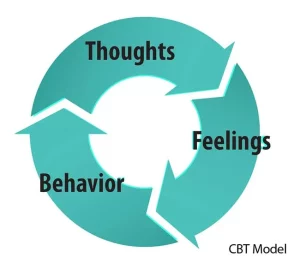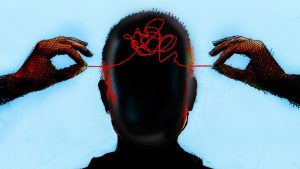Contents
- 1 What Is Cognitive-Behavioral Therapy (CBT)?
- 2 How CBT Works?
- 3 Disorders CBT Can Treat
- 4 Benefits of Cognitive Behavioral Therapy
- 5 Long-term Benefits Of Cognitive Behavioral Therapy
- 6 Drawbacks Of CBT
- 7 Who Should Consider Cognitive Behavioral Therapy?
- 8 Who Can Provide Cognitive Behavioral Therapy?
- 9 Who Should Consider Using Cognitive Behavioral Therapy?
- 10 Who Should Not Consider Cognitive Behavioral Therapy?
- 11 How Is Cognitive Behavioral Therapy Approached?
- 12 Conclusion
- 13 A Word From Therapy Mantra
What Is Cognitive-Behavioral Therapy (CBT)?
 Cognitive-behavioral therapy, or CBT, is a type of psychotherapy that helps people change the way they think about and behave around certain situations. It can be helpful for people with anxiety, depression, or other mental health conditions.
Cognitive-behavioral therapy, or CBT, is a type of psychotherapy that helps people change the way they think about and behave around certain situations. It can be helpful for people with anxiety, depression, or other mental health conditions.
CBT is based on the idea that our thoughts and feelings affect our behavior. If we can change the way we think, we can change the way we behave. CBT helps us to identify and challenge negative thoughts and beliefs that may be causing our problems.
CBT is usually a short-term treatment, and it can be used to treat a variety of mental health conditions. It has been shown to be effective in treating anxiety, depression, phobias, and other mental health conditions.
How CBT Works?
Cognitive Behavioral Therapy is based on the idea that our thoughts and feelings affect our behavior. If we can change the way we think, we can change the way we behave. CBT helps us to identify and challenge negative thoughts and beliefs that may be causing our problems. It’s usually a short-term treatment, and it can be used to treat a variety of mental health conditions. It has been shown to be effective in treating anxiety, depression, phobias, and other mental health conditions.
Disorders CBT Can Treat

Cognitive-behavioral therapy, or CBT, is a type of psychotherapy that helps people change the way they think about and behave around certain situations. It can be helpful for people with anxiety, depression, or other mental health conditions.
CBT is based on the idea that our thoughts and feelings affect our behavior. If we can change the way we think, we can change the way we behave. CBT helps us to identify and challenge negative thoughts and beliefs that may be causing our problems.
Cognitive Behavioral Therapy is based on the idea that our thoughts and feelings affect our behavior. If we can change the way we think, we can change the way we behave. CBT helps us to identify and challenge negative thoughts and beliefs that may be causing our problems. It’s usually a short-term treatment, and it can be used to treat a variety of mental health conditions. It has been shown to be effective in treating anxiety, depression, phobias, and other mental health conditions.
Anxiety
When you have anxiety, it can be hard to overcome some of your fears and worries. Cognitive-behavioral therapy has been shown to help with panic disorder, general anxiety, social anxiety, and PTSD.
Depression
Being severely depressed will impact every part of your life. Cognitive-behavioral therapy is used as an effective treatment for depression because it helps individuals change the way they think about themselves and their future. It also helps people learn healthier ways of coping with problems that may trigger feelings of depression.
OCD
Some individuals face persistent unwanted thoughts or urges (obsessions) that make them feel driven to perform certain actions (compulsions). The repetitive nature of these obsessions and compulsions can drive those who from OCD crazy. CBT has been shown to be the most effective treatment for those who suffer from OCD.
Schizophrenia and other psychotic disorders
Although there is not a cure for schizophrenia, CBT can help an individual learn how to cope with their symptoms and live a more productive life. Research has shown that CBT is just as effective as medication at reducing positive symptoms of psychosis such as delusions and hallucinations.
Eating Disorders
Individuals who struggle with eating disorders such as bulimia or anorexia often have strong negative feelings about themselves and their bodies. CBT helps people develop healthier attitudes towards food and body image. It also helps them learn ways to resist bingeing and purging impulses, which eventually leads to weight restoration.
Panic Disorder
Panic disorder is a type of anxiety disorder that involves sudden feelings of fear and/or dread. CBT has been very effective for treating panic disorder. Because it can reduce the number of panic attacks individual experiences.
Social Anxiety

Some people are afraid to interact with others in social situations due to extreme self-consciousness or self-doubt. Cognitive-behavioral therapy helps individuals with social anxiety overcome some of their fears and concerns about others.
OCD is an anxiety disorder that shows obsessive thoughts or compulsive acts, causing significant distress or impairment in daily life. People with OCD often show symptoms early in life, but some do not seek treatment until later on during adolescence or adulthood when OCD symptoms start to negatively impact their lives. Symptoms of OCD include excessive fear of contamination, repeating behaviors like checking or hand washing and having irrational thoughts (impulsivity).
Depression is a mood disorder that can cause an individual to experience sadness, low energy, or changes in behavior for long periods of time. Depression may also lead to physical problems including fatigue, insomnia, digestive disorders, weight loss or gain, and memory difficulties.
Benefits of Cognitive Behavioral Therapy

Studies have shown cognitive behavioral therapy to offer long-term benefits for many people with different mental health issues including anxiety disorders, OCD, trauma-related stress, and depression. CBT has also been effective in helping people with psychosis.
CBT helps you identify negative thoughts, beliefs, actions, and reactions to certain situations that may be causing your stress or anxiety. Once you become aware of these root causes, you can learn new coping skills and behaviors that will help reduce your problems in the long term.
- Identify Negative Thoughts– Situations that cause stress and anxiety can be very challenging. However, recognizing the negative thoughts that contribute to your stress or anxiety can help you identify how you want to change them.
- CBT helps people examine their beliefs surrounding topics such as relationships, work, family, goals, and health. By learning how these beliefs developed and identifying when they may no longer be relevant to what you really want in life, you can develop new ways of coping with problems or challenges before they overwhelm you.
- Take Action- CBT teaches people how to realistically look at the situations causing them the most stress and anxiety. This allows individuals to build confidence in problem-solving skills while accepting a certain level of uncertainty in life because nothing is ever 100% under control.
Long-term Benefits Of Cognitive Behavioral Therapy

Cognitive Behavioral Therapy, or CBT, is a type of psychotherapy that has been shown to offer long-term benefits for many people with different mental health issues. CBT helps you identify negative thoughts, beliefs, actions, and reactions to certain situations that may be causing your stress or anxiety. Once you become aware of these root causes, you can learn new coping skills and behaviors that will help reduce your problems in the long term.
Some of the long-term benefits of CBT include:
1. Improved mental health
People who receive CBT show improvement in their overall mental health. This means they are less likely to experience symptoms such as anxiety, depression, and stress in the future.
2. Improved interpersonal relationships
The skills learned through CBT help people learn how to communicate well with others and resolve conflicts. This can lead to healthier, more supportive relationships with family members, significant others, or friends.
3. Decreased feelings of stress and anxiety
Many people who receive CBT show a decrease in the amount of stress and anxiety they feel on a day-to-day basis. People also report an improvement in their ability to manage negative emotions that come up throughout the day.
4. Improved coping skills
Instead of dealing with problems using unhealthy coping mechanisms such as drinking too much, overeating, overspending, etc., individuals now have better problem-solving skills which will help them deal with future problems in healthy ways.
5. Improved productivity at work
Several studies have looked into the relationship between CBT and academic performance. Results from these studies suggest that students who receive CBT show improvement in their grades from a B+ to an A-.
6. Reduced pain
Cognitive behavioral therapy has also been shown to reduce chronic pain, making it a valuable treatment for people suffering from conditions such as arthritis, fibromyalgia, headaches, backaches, etc.
Drawbacks Of CBT

While CBT has many benefits, it is not perfect for everyone. Some of the drawbacks of CBT include:
1. can be expensive- One of the main drawbacks of CBT is that it can be expensive, especially if you are seeing a therapist privately.
2. not everyone responds to CBT- Not everyone who tries CBT will respond positively to it. Some people may find that the therapy does not help them resolve their problems or they may feel uncomfortable discussing their personal issues with a therapist.
3. can be time-consuming- Another drawback of CBT is that it can be time-consuming. This means that you will need to be willing to commit to attending therapy sessions on a regular basis and doing homework between sessions.
4. requires commitment- CBT requires a significant amount of commitment on the part of the client. You will need to be willing to learn about your thoughts, feelings, and behaviors in order to see results from therapy.
Who Should Consider Cognitive Behavioral Therapy?
If you’re experiencing a mental health condition like depression or anxiety, it’s possible cognitive behavioral therapy could benefit you greatly. Studies show it to be effective for many conditions like PTSD, OCD, social phobias, and more. It’s also beneficial for people who want to make healthy changes in their lives such as quitting smoking or losing weight.
Who Can Provide Cognitive Behavioral Therapy?

Cognitive-behavioral therapy is usually provided by a clinical psychologist, psychiatrist, licensed social worker, or another mental health professional who has received special training in cognitive behavioral therapy. A small number of therapists may also have an established background in certain disciplines like educational psychology or counseling. Due to the availability of this training, it’s important to research your options before choosing a provider.
Find a Cognitive Behavioral Therapist- There are cognitive-behavioral therapists available through your insurance company, hospital, mental health clinic, or even private practice. It is important to find someone who specializes in CBT. And has experience dealing with the types of anxiety problems you may be experiencing. You can also check out reputable online directories that offer listings for qualified therapists practicing CBT.
Who Should Consider Using Cognitive Behavioral Therapy?
Cognitive Behavioral Therapy (CBT) may help people suffering from various forms of emotional distress including anxiety disorders like GAD, major depression, eating disorders like bulimia nervosa and anorexia nervosa.
Types of therapists that frequently provide CBT therapy include clinical psychologists, licensed professional counselors, registered nurses, and social workers.
Who Should Not Consider Cognitive Behavioral Therapy?
People who have psychotic or bipolar disorders should not attempt CBT therapy. There are other therapies that may be more appropriate for people experiencing certain forms of psychosis. In addition, children under the age of seven and individuals who refuse to get therapy because they do not feel a need for help should not begin with CBT. So people in this category may benefit from individualized psychotherapy. As it addresses unique issues related to their life situation.
How Is Cognitive Behavioral Therapy Approached?
CBT typically approaches one on one in short sessions schedule, once or twice per week. Although intensive treatment involving up to eight hours per day can also be effective. Therefore, cognitive-behavioral therapist will listen carefully to understand the underlying cause of a client’s distress. And then develop a treatment plan which focuses on changing problematic thought patterns and behaviors.
Having realistic expectations about therapy is important. However, CBT can help many people address emotional problems. But it does not provide immediate relief to every person who undergoes this type of therapy. It takes time to learn new coping skills that can alleviate symptoms like sadness or anger. But with consistency and hard work, CBT can be an invaluable tool in your recovery arsenal.
Conclusion
Cognitive-behavioral therapy, or CBT, is a type of psychotherapy that helps people understand and change the way they think. It commonly helps treat mental health conditions such as depression and anxiety. CBT can help you learn how to deal with difficult thoughts and feelings, manage stress, and set goals. Therapists who use CBT may also give you homework assignments to do between sessions.
A Word From Therapy Mantra
Your mental health — Your psychological, emotional, and social well-being — has an impact on every aspect of your life. Positive mental health essentially allows you to effectively deal with life’s everyday challenges.
At TherapyMantra, we have a team of therapists who provide affordable online therapy to assist you with issues such as depression, anxiety, stress, workplace Issues, addiction, relationship, OCD, LGBTQ, and PTSD. You can book a free therapy or download our free Android or iOS app.


